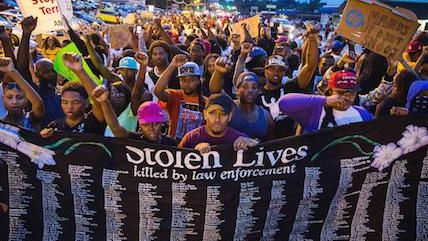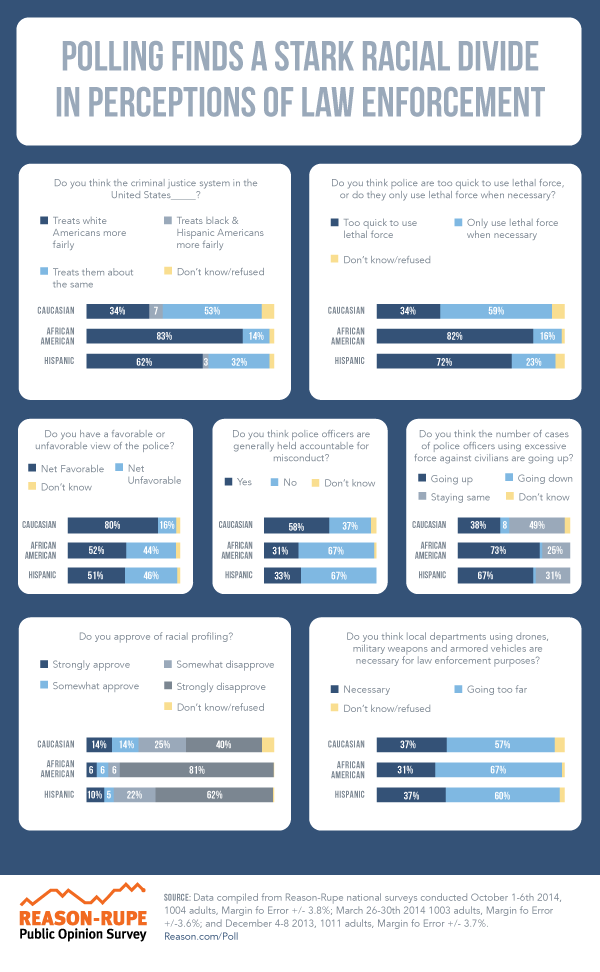Why We Should Care About the Racial Divide in Perceptions of Law Enforcement

The American Idea posits that the choices we make shape individual success. However, the State can undermine this promise if its most powerful tool—its policing power—is misused or allows external characteristics to skew the application of justice. It's demoralizing and imposes a narrative of inferiority. Recent Reason-Rupe polling reveals Americans are significantly divided in their perception of abuse and bias in the criminal justice system and this perception divide alone ought to give us pause.
Irrespective of the actual extent of systemic bias, perception alone can be debilitating. The perception of a biased justice system may lead one to be less willing to give benefit of the doubt and to feel that self-determination is out of their grasp.
Compiling Reason-Rupe polling data finds dramatic racial differences in perceptions of law enforcement and the criminal justice system more generally. Minorities tend to believe the police too often use excessive force, that the cases of excessive force are on the rise, but also that police officers are not generally held accountable for their conduct.
Stark Perception Gap

Granted, majorities of all racial groups—80% white, 52% black, 51% Hispanic—say they have a favorable view of the police. However, black and Hispanic Americans (82% and 72% respectively) are far more likely to believe police are too quick to use lethal force, compared to 34 percent of white Americans. In contrast, a solid majority (59%) of white Americans believe the police only use lethal force when necessary, compared to 16 percent of black Americans and 23 percent of Hispanics.
Furthermore, both African-Americans and Hispanics feel that the number of excessive force cases is increasing—73% and 67% respectively—compared to 38 percent of Caucasians.
Not only that, but 67 percent of black and Hispanic Americans feel police officers are generally not held accountable for misconduct, compared to only 37 percent of white Americans. Notice, the wording did not say "occasionally" but "generally". Minorities tend to view lack of police accountability as the rule, not the exception. Conversely, a solid majority of Caucasians (58%) says officers are held accountable before the law, compared to a third of nonwhite Americans.
Perhaps most troubling for any Republic committed to the rule of law, is that nonwhite Americans perceive the criminal justice system to treat white Americans more fairly. While 53 percent of Caucasians believe the system treats all racial groups the same, 83 percent of African-Americans and 62 percent of Hispanics say Caucasians are treated more fairly under the law.
Reality Check
Why the perception difference? There is empirical evidence that does reveal racial bias in the application of justice.
For instance, in Ferguson, MO even though white residents are more likely to be caught with contraband, black Ferguson residents disproportionately comprise 86 percent of all traffic stops and 92 of all arrests despite representing 67 percent of the community. The Missouri Attorney General's Office's 2013 racial profiling report found 1 in 3 white Ferguson residents who were stopped and searched were caught with contraband compared only 1 in 5 black residents who were stopped and searched.
Moreover, a 2010 ACLU report found that although white and black Americans use marijuana at equal rates, African-Americans are nearly 4 times as likely to be arrested for marijuana possession.
Implications
Instead of drawing lines and labeling others as whiners/complainers or racists, we should take a moment to consider the possibility that no particular side has a complete monopoly on reality.
Part of the problem is that most individuals have difficulty understanding the experiences of others, particularly those outside of their social orbits. For instance, an ABC/Washington Post survey found that nearly two thirds of both white and Hispanic Americans did not believe black Americans in their communities experience racial discrimination. Yet the results are completely flipped for black Americans: nearly two-thirds say blacks in their communities do experience discrimination. This includes 33 percent who say it occurs "often" and 29 percent who say "occasionally" or "rarely."
Further complicating the perception divide is the relative group sizes. Suppose you have at least two groups: one of which comprises the majority and sees little problem but the other group is a minority and says there is a problem. Who might you be more inclined to believe? Personally, I'm inclined to believe both sides probably report what they genuinely observe in their own lives.
Nevertheless, James Madison's warning in Federalist #10 of tyranny of the majority should prompt us to pay careful attention to the perceptions of the minority:
"Complaints are everywhere heard from our most considerate and virtuous citizens, equally the friends of public and private faith, and of public and personal liberty, that our governments are too unstable, that the public good is disregarded in the conflicts of rival parties, and that measures are too often decided, not according to the rules of justice and the rights of the minor party, but by the superior force of an interested and overbearing majority.
…When a majority is included in a faction, the form of popular government…enables it to sacrifice to its ruling passion or interest both the public good and the rights of other citizens." [Emphasis added]
The fact that white Americans are the majority and don't perceive much of a problem in the criminal justice system necessarily means most elected officials don't perceive a problems and thus don't pursue reform.
For instance, in the United States, the average member of Congress in 2014 is 57 years old, college educated, male, and Caucasian. As I explain in an earlier post, using a statistical technique we can predict the likelihood this average member of Congress perceives bias in the criminal justice system. Such a test found there is a 65% chance the average member of Congress does not think there is racial bias in the system. Without perceiving a problem, there is little reason to expect them to pursue reform.
And this speaks to the core of why so many Ferguson protestors are justifiably upset. It reasonably appears that in the midst of unarmed black men—or any unarmed suspects for that matter—being shot and killed by those entrusted with their protection, law enforcement officials are rarely held accountable. Not only that, but elected officials don't seem to believe there is even a problem. This naturally leads many to conclude those in power do not believe them or worse—even care about them.
As Ronnie Natch a peaceful Ferguson protestor put it: "This was a chance to vent about the national treatment of black men across the country… We want to show up at the front door every day and say, through words, that this shooting is not going to be swept under the rug …There have just been too many deaths."
All lives matter. Until we can genuinely attempt to understand the experiences of others—rather than label those with whom we disagree as complainers, Marxists, or racists—we cannot move forward.
* Contraband Hit Rate=(Searches with Contraband Found/Total Searches) X 100


Show Comments (54)